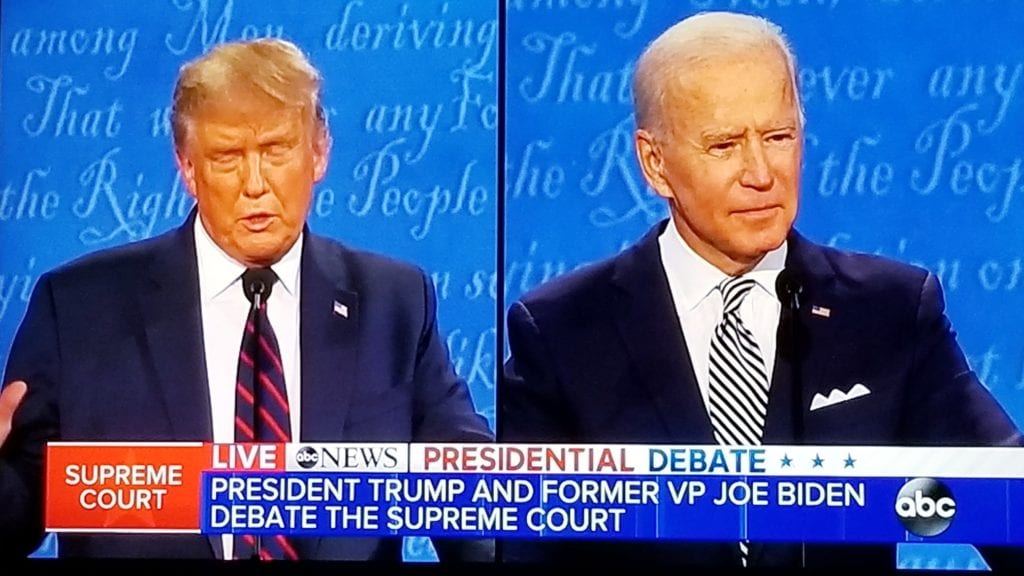The first presidential debate between President Donald Trump and former Vice President Joe Biden took place on September 29, 2020. The 90-minute debate featured a series of bitter exchanges and name-calling as Moderator Chris Wallace of Fox struggled to facilitate the conversation. Wallace repeatedly admonished the president for disregarding debate rules and interrupting Biden’s speaking time. A “will you shut up, man…It’s hard to get any word in with this clown” from Biden serves as a recap of how the night went and resonates with many of the American people.
Among the six debate topics, the issue of race and violence in our cities was prompted followed by a question to gauge each candidate’s ability to combat race issues. In response, Trump claimed that he was better suited than Biden to eliminate these issues and is “doing better than any Republican has done in a long time” – an opinion that is unpopular among Black and Brown voters. The President also referenced the 1994 Crime Bill, a controversial piece of legislation that reinforced punitive responses to deter crime and incentivized states to build more prisons. In an effort to weaken Biden’s arguments, Trump accused Biden of referring to Black people as superpredators. Biden refuted Trump’s accusations with the statement “I did not say that. I’ve never said that.”
Fact- Check: Did Biden Call Black People Superpredators?
According to NBC News, Trump’s accusation was “mostly false.” In fact, it was Hillary Clinton, the former United States Secretary of State, who used the term in support of the 1994 Crime Bill. However, Biden, a co-author of the law, did warn of “predators” in a 1993 floor speech he delivered in support of the bill. According to Biden’s speech in 1993, predators were “beyond the pale” and must be sanctioned away from the rest of society because the criminal legal system does not know how to rehabilitate them. Since then, Biden has publicly apologized for his past stance on criminal legal issues and admitted that the decisions made in that era “trapped an entire generation.”
The term “superpredator” was coined in 1996 by John Dilulio, a Princeton professor who predicted that a wave of ruthless, violent young offenders was on the horizon. According to Dilulio’s theory, these young people were so impulsive that they could engage in violent crimes without hesitation or remorse. A 1997 report published by the Office of Justice Programs at the U.S. Department of Justice found that juvenile courts in the United States processed more than 1.7 million delinquency cases in 1995, a 7-percent increase over the 1994 caseload and a 45-percent increase over the number of caseloads handled in 1986. Compounding an influx of juvenile proceedings was significant research suggesting a strong relationship between childhood adversity and involvement with the juvenile or adult criminal systems. Eventually, public officials supported Dilulio’s theory, which resulted in tough-on-crime policies for young and adult offenders across the country.
While it is true that incarceration rates were already high by 1994, the passage of the federal crime bill disproportionately impacted communities of color. The bill exacerbated racial and ethnic disparities in state prisons by deploying more police into neighborhoods of color. Considered “one of the cornerstone statutes that accelerated mass incarceration,” a combination of more prisons, racial profiling, and mandatory minimum sentencing funneled a generation of Black and Brown people into the juvenile and criminal legal system. Today, The United States and federal prison population has increased since 1994 and widened racial disparities. According to a 2020 data analysis, more than 60% of people in prison today are people of color and Black men are six times as likely to be incarcerated as white men, with Hispanic men being 2.7 times as likely. Consistent with both candidates’ remarks, the Black and Brown community continues to bear the harshest brunt of discriminatory policies and practices.
Fight the Fake: The Importance of Fact-Checking and How to Recognize A False Claim
In a world with unlimited access to social media and the internet, fact-checking is conducive to making informed voting decisions. Making informed voting decisions means that an individual is knowledgeable about the topics and positions of candidates who are running for office. Additionally, it means that an individual is able to make their own decisions without influence from outside factors, including misinformation found online. Acknowledging that fact-checking is not always an easy task, especially with constant, savvy efforts against it and persuasive content, here are five ways to combat misinformation and cast informed votes:
- Detect whether the statement is a claim of fact.
-
- When a statement that you heard jumps out to you, ask yourself if it is a claim of fact. It’s important to note that opinion, rhetoric, and satire have a place in public debate. Although you can not fact-check opinion, fact-checkable claims can be easily spotted. Sometimes, these claims feature tangible nouns (housing or insurance), numbers, and comparisons (“the economy is doing better under my administration”), and they also contain statements about what a candidate has achieved.
- Think about the context of the claim.
-
- It may be helpful to ask yourself what the claim leaves out. When a candidate claims to have influenced massive economic growth, for example, it’s important to look into the status of the economy before the candidate was elected into office.
- Find reliable sources to test the validity of the claim.
-
- Depending on the claim you are fact-checking, the best sources may be government-run websites and records, peer-reviewed articles with large sample sizes, or well-known organizations with credibility such as The Commission on Presidential Debates.
- Is the candidate claiming credit that is not due?
-
- Another misleading trick is to claim credit for something that was the result of another elected official’s agenda. If an elected official claims that they combated systemic issues while in office, it’s worthwhile to dig deeper to see who was responsible for the specific changes they are referring to.
- Accept that you’ll have critics.
-
- Lastly, it’s important to recognize that you will have critics. As you know, everyone is entitled to their opinion even if it is different than your own. However, that does not mean you have to conform- you have the autonomy to make decisions based on your lived experiences.
All in all, ignore the Twitter and Facebook trolls and make informed decisions for you and your loved ones. Despite how advanced and easily accessible information is on TV, social media, and the internet, it is ultimately up to you to remain vigilant and seek the truth.














